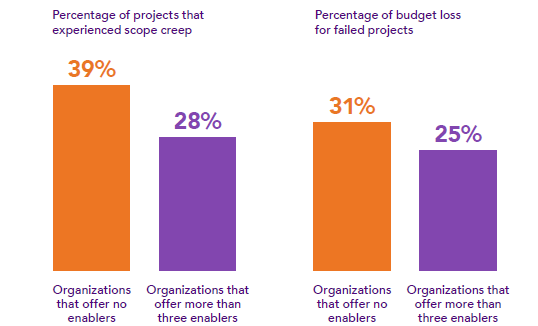This is the second blog post in our series on clinical trial project management. In the first blog post, we established that effective clinical trial project managers do more than just keep tasks on schedule; they play a crucial role in ensuring project success and operational efficiency. Organizations that adopt project management practices achieve a much higher success rate in meeting their project goals and experience less financial waste than those without proven methodologies.
Understanding the discipline of strategic project management practices is the first step toward achieving success, but that is not enough. Read on to discover the additional skills needed for effective clinical trial project management.
1. Project Management Training & Preservation of Project Knowledge
The actual strategic discipline of project management requires education, training, and experience to really master project management skills. Project management training is a strategic discipline that is guided by ISO standards and is afforded an internationally recognized certification program.
While it makes sound business sense to invest in providing training opportunities for project managers and hiring personnel (if available) who have project management experience and/or certification, providing for continuity of project knowledge is another important strategy.
When organizations devote resources to ongoing project management training, offer a defined project management career path, and establish formal knowledge transfer processes, project outcomes are significantly improved.1
Develop Knowledge Transfer Processes
Knowledge transfer is the process of organizing, creating, capturing, distributing, and integrating knowledge to support mutually beneficial collaborations between departments and to ensure that the “know-how” of organizational experts is available for future employees.2 Turnover is a constant in the clinical trials industry. Project managers are frequently reassigned, sub-project leads rotate in and out, and team members come and go—often midstream.
Without a formal process to preserve and pass on institutional knowledge, the new person stepping into the role, or an experienced project manager moving to an unfamiliar area, is faced with a learning curve that wastes time and money, impairs project continuity, and can result in lost or strained business with outside organizations.
Expect Better Project Outcomes From Organizations Good at Knowledge Transfer2

Successful businesses make education and knowledge transfer a priority and create a culture that supports these activities. Capturing and sharing essential knowledge results in cost savings, decreases in error rates and risk, improved project metrics, increased production, consistency, retention of talent, and innovative ideas. Organizations that are good at knowledge transfer have an increase of 20 percent in projects meeting original goals, a 32 percent increase in projects being completed on time, and 27 percent more projects completed within budget.2
2. A Well-Rounded Mix of Skills Is Essential for Clinical Trial Project Management
Soft Skills
Project managers require a diverse set of soft skills to effectively lead their teams and ensure the success of their projects. Communication is paramount, as project managers must clearly convey goals, expectations, and feedback to team members and stakeholders. While strong organizational skills help them manage multiple tasks and deadlines efficiently, leadership and motivational abilities are essential for inspiring and guiding their teams through challenges.
Problem-solving skills enable them to address issues promptly and creatively. Additionally, emotional intelligence allows project managers to understand and manage their own emotions, as well as empathize with others, fostering a positive and collaborative work environment. These soft skills, combined with technical expertise, are crucial for project managers to successfully navigate the complexities of their roles.
A survey conducted on clinical research professionals, most of whom worked in project or study management, demonstrated that 82% of participants identified effective communication as either the most or second most important characteristic of a successful/ideal project leader. Overall, besides effective communication, clear goals and a proactive working style were the most frequently selected categories.3 These are traits to nurture in current project managers and to look for in new hires.
Capabilities-Building for Individuals and Teams
Research shows that scope, schedule, and budget remain important, but a mix of skills focused on influencing outcomes, building relationships, and achieving organizational strategic goals is also essential. These top five skills/capabilities, listed in order of priority, are: 4
- Relationship building (empathetic approach)
- Collaborative leadership
- Strategic thinking
- Creative problem-solving
- Commercial awareness
These skills are lacking in many project managers, and with the shrinking talent pool (a challenge increasingly felt across industries), it’s difficult to recruit people who possess them. However, less than half of project managers said their organization provided support in developing these skills. Data indicates that only one in four organizations prioritizes a learning culture or employee engagement.
Organizations that offer more than three enablers to support the listed skills and capabilities report significantly higher project performance rates.4 These enablers include:
- Providing coaching and mentoring to assist project managers in planning and achieving their professional development goals
- Offering training on new working methods
- Establishing communities of practice for sharing knowledge and expertise
- Conducting training on resilience and change management
- Engaging vendors or consultants to support the introduction of new work practices
- Creating employee resource groups to help navigate change
- Managing change with support via mental health resources
Organizations that reported no enablers were more likely to be impacted by scope creep challenges and a higher proportion of budget loss.4
The Presence of Enablers and the Impact on Project Scope Creep and Budget Loss

Source: PMI Annual Global Survey on Project Management 2023
3. Enhance Team Collaboration
Avoid Micromanagement
Project managers oversee the work of the project team to deliver the project on time and within budget. In doing so, it’s essential to avoid slipping into becoming a micromanager. A micromanager closely controls and supervises the work and processes, often to a degree that can hinder autonomy or efficiency.5
Micromanagers often:
- Focus on details with constant monitoring instead of focusing on results
- Hold frequent status meetings
- Control every aspect of the project rather than trust and delegate
This often leads to excessive meetings, bad team morale, and limits innovation, creativity, and passion. The team dynamics are negatively impacted with eroded trust, communication, and collaboration, resulting in increased employee stress and burnout. This can lead to costly employee turnover and diminished project outcomes.
You can avoid micromanagement by fostering:
- Project transparency
- Employee visibility
- Open communication
- Effective delegation
- Shared goals
- Building trust and teamwork
Promoting autonomy and collaboration in clinical trial project management contributes to the success of the projects and teams.5
Know the Team Members and Their Roles
Part of building trust and teamwork is knowing your role and knowing your sub-project managers and their roles. Defining clear roles, responsibilities, and expectations for team members is essential for empowering them to make decisions.
Frequently, I participate in conference calls with clients for the purpose of determining what study materials are needed at sites. Yet during these calls, the client’s team members will often have a long discussion ironing out the details regarding who is responsible for what. Such things should have been nailed down long before. Lack of preparation wastes precious time.
A Good Experience Is Essential
At Imperial, effective clinical trial project management is the cornerstone of our business, and the client experience is a major part of the project manager’s responsibility. We partner with sponsors and CROs to provide services such as ancillary trial supplies and equipment procurement and management, kitting, customized premium print and digital production, translation services for 100+ languages, targeted patient engagement programs, along with warehousing and global logistics.
Our accomplished project managers provide one point of contact for these services. They collaborate with our clients and subject matter experts to control costs, adhere to timelines, and ultimately ensure the overall success of clinical studies. This approach promotes greater efficiency, resulting in higher quality, faster turnaround times, and lower overall costs.
The information in this blog post is taken, in part, from our free second edition ebook, Effective Project Management for Clinical Trials: A Business Approach. This e-book provides more detailed information and a closer examination of effective clinical trial project management. You can also download our project management ebook tailored to ancillary supplies and equipment management (free): Ancillary Supplies and Equipment for Clinical Trials: A Project Management Approach.
Resources
1PMI (2016). Pulse of the Profession: The High Cost of Low Performance (https://www.pmi.org/-/media/pmi/documents/public/pdf/learning/thought-leadership/pulse/pulse-of-the-profession-2016.pdf)
2PMI (2015). Capturing the Value of Project Management Through Knowledge Transfer (https://www.pmi.org/learning/thought-leadership/pulse/capture-value-knowledge-transfer)
3Johanna Schenk, M.D., PhD, Yakov Datsenko, M.D, Jan. 1, 2013, Leading Clinical Projects, Applied Clinical Trials (http://www.appliedclinicaltrialsonline.com/leading-clinical-projects)
4PMI (2024). Pulse of the Profession (https://www.pmi.org/learning/thought-leadership/pulse/future-of-project-work)
5PPM Express, June 21, 2023 (https://ppm.express/blog/reducing-micromanagement)

